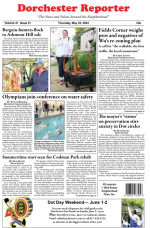February 24, 2023
The Supreme Judicial Court today ordered a new trial for Omay Tavares, convicted of a 2010 murder on Rosseter Street, because his attorney, leading his first ever murder case after serving a two-year suspension for "gross incompetence" that got two other clients imprisoned, failed to act on a document from prosecutors that seemed to another man as the killer.
The ruling upholds a Suffolk Superior Court judge's decision to grant Tavares a new trial, over an appeal from the Suffolk County District Attorney's office.
Tavares filed a formal motion for a new trial in 2015; the case then bounced between Suffolk Superior Court and the SJC until the SJC finally heard arguments last October.
According to the SJC's summary of the case, Tavares was initially represented by a public defender following his arrest for the murder of George Thompson, found riddled with bullets on Jan. 7, 2010, but a family friend hired a private attorney, who agreed to represent him for a flat fee of $5,000. The lawyer did not tell Tavares or his family that he "recently had completed a one-year bar suspension for gross incompetence resulting in his clients' imprisonment."
Then, the summary continued:
"In preparation for what would be his first murder trial as lead attorney, counsel requested and received court-ordered funds to hire experts in the fields of cell site location information (CSLI) and ballistics, but did not retain an investigator to find or speak with witnesses.
"On September 23, 2011, approximately two weeks before the trial was scheduled to begin, the prosecutor advised counsel that the Boston police department was in possession of a proffer [a statement from an interview] from a confidential informant containing information about an alleged third-party shooter involved in the victim's murder. Counsel was not provided with a redacted copy of the proffer until October 4, 2011, one day before trial was to begin.
"According to the proffer, two individuals, 'H.H.,' who was armed with a Taurus nine millimeter handgun, and 'another man,' went to the victim's apartment intending to rob the victim of money and marijuana. When the victim lunged for the gun, he was shot and killed. Trial counsel failed to request a continuance to investigate the information contained in the proffer letter and failed to inform the defendant that it existed."
A jury found Tavares guilty of first-degree murder, which carries a sentence of life without parole. At trial, his lawyer did argue, unsuccessfully, that police failed to investigate other possible suspects and that Tavares was not the shooter. But he never mentioned the police interview document he had gotten. Even worse, the court continued:
"Indeed, when H.H., the man alleged in the proffer to be a third-party culprit, appeared in court on the first day of jury empanelment and, in counsel's presence, was ordered by the judge to be available for trial, counsel did not request a continuance to interview him, or take any other measures to capitalize on the presence of H.H."
After his conviction and after learning of the police document - and getting a new lawyer - Tavares filed a motion for a mistrial on the grounds of "ineffective assistance of counsel."
A judge agreed, but the DA's office appealed, arguing that, at best, the police document only proved somebody else had pulled the trigger and that Tavares should still have been found guilty of first-degree murder under the state's "felony murder" doctrine, in which he would be as guilty as the shooter since the death occurred during a felony he was participating in.
The SJC, however, disagreed:
"The Commonwealth's theory at trial was that the defendant was the lone shooter. The prosecutor neither presented evidence of a joint venture, nor requested instructions on felony-murder. Thus, what otherwise might have happened if the case had been tried differently is purely speculative."
And so, the court concluded:
"The judge noted that the Commonwealth's evidence against the defendant was 'strong,' but 'not overwhelming.' Where, as here, use of the proffer evidence could have raised a reasonable doubt as to whether the defendant murdered the victim, we cannot say that the judge erred or abused her discretion in concluding that counsel's assistance constitutionally was ineffective."
Case docket, includes briefs by both sides and a link to video of oral arguments before the SJC.


